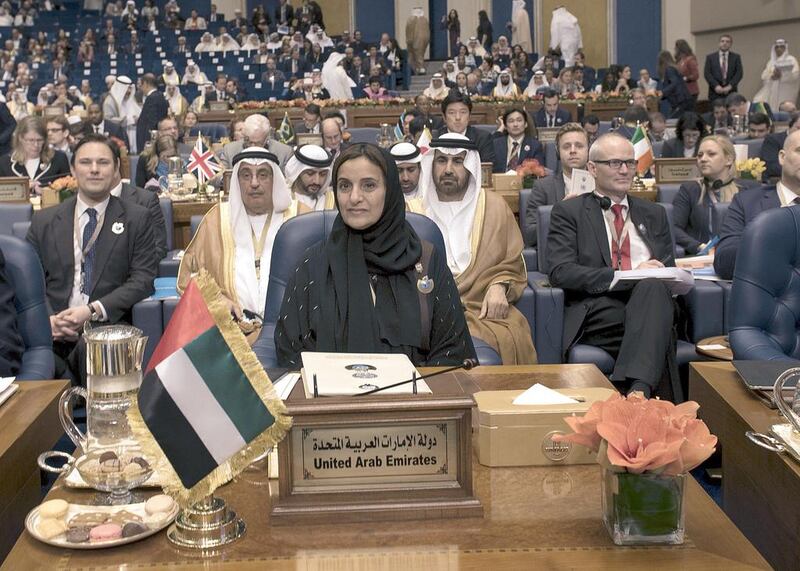KUWAIT CITY // Donors at an international aid conference in Kuwait pledged US$3.8 billion on Tuesday to help victims of the Syrian conflict, as the country’s emir warned of the vast consequences of inaction.
“We are meeting here to face the biggest humanitarian catastrophe in the modern history of mankind,” Kuwait’s emir, Sheikh Sabah Al Ahmed Al Jaber Al Sabah, said at the start of the event.
Sheikh Sabah said the results of international inaction in Syria has made the country “a threat to international peace and security” and a “safe haven” for terrorist organisations.
In response, the Kuwaiti government promised US$500 million (Dh1.8bn) in aid, the same amount it pledged at last year’s conference, also held in Kuwait.
The UAE meanwhile pledged $100m, surpassing its contribution of $60m last year.
“The UAE’s historic role in giving support and assistance to our Syrian brothers is part of the country’s humanitarian commitments ... there is an urgent need to provide support and assistance to Syrian refugees all over the world to reduce their suffering,” said Sheikha Lubna Bint Khalid Al Qasimi, Minister of International Cooperation and Development and Head of the National Committee for the Coordination of Foreign Aid.
The United States pledged $507m, while Saudi Arabia pledged $60m.
The United Nations-backed aid conference has been hosted by Kuwait each year since 2013. The event was attended by representatives from 78 governments and 40 international aid agencies and came as the UN stressed the need for a long-term approach to helping those affected by the conflict.
To achieve this, the UN has appealed for $8.4bn to fund its Syria operations this year: $2.9bn to be used inside Syria and $5.5bn in neighbouring countries flooded with refugees. The money pledged in Kuwait on Tuesday is expected to go a long way towards fulfilling that goal, though the UN will continue fund raising throughout the year to meet the needs of Syrians.
At the conference, representatives from Jordan and Lebanon said that while their countries were committed to assisting Syrian refugees, they are in dire need of assistance due to the degree of stress the crisis has placed on their economies and social structures.
The regime of Bashar Al Assad continues to attack civilians in rebel-held areas while the rise of extremist militant groups such as ISIL further destabilises the region. More than 220,000 Syrians have been killed since the uprising against the regime began in March 2011.
With about 8 million people displaced, much of the country’s infrastructure destroyed by the war and access for aid groups severely limited, Syria is in the midst of a vast humanitarian crisis. There are nearly 4 million refugees registered with the UN in neighbouring countries, while thousands more are thought to be unregistered.
“A relentless, ruthless war is destroying Syria,” said Ban Ki-moon, the UN’s secretary general, at the end of the conference. “Today the international community stepped forward in an unprecedented show of support.”
In the year ahead, the UN aims to work more closely with the governments in Lebanon, Turkey, and Jordan to help them shoulder the burden of hosting Syrian refugees.
While Adrian Edwards, spokesperson for UNHCR, the UN refugee agency, said it will not be pressing host governments to change the legal status of refugees, it is clear that the organisation is preparing for Syrians to have a long-term presence outside their own borders.
“We are still very far away from a political solution to this crisis, which is what we need to bring the level of violence down and to really begin to deal with the major consequences to the infrastructure of Syria ... and the huge numbers of people that have fled to neighbouring countries as refugees and really want to come back home,” said Valerie Amos, the UN’s under-secretary-general for humanitarian affairs and emergency relief coordinator.
As part of the UN’s new long-term approach, UNHCR is aiming to move the refugees out of tents and into prefabricated houses. It also wants to assist governments with integrating refugee children into schools, and providing refugees with better health care, clean water and sanitation. Another goal is to find a way for the refugees to contribute to local economies, while at the same time balancing the needs of the local population.
A big question remains over how long it will take for the funds pledged by donors to arrive with aid organisations. Mr Ban said on Tuesday that 90 per cent of last year’s pledges had been “committed”, but aid agencies have complained that not all of the money promised previously had arrived – exactly how much was missing was unclear.
On the sidelines of the conference, UN officials expressed frustration about the pledging process, questioning how donors could promise donations without clear specifications on where the money was to be used or when it would arrive.
While donors could make a general pledge, or earmark money for a specific use, Mr Edwards said it was not immediately clear how the donations promised would be divided up for spending, either inside or outside Syria.
Last year $2.4bn of aid was promised at the conference, while in 2013 there were pledges totalling $1.5bn.
jvela@thenational.ae





